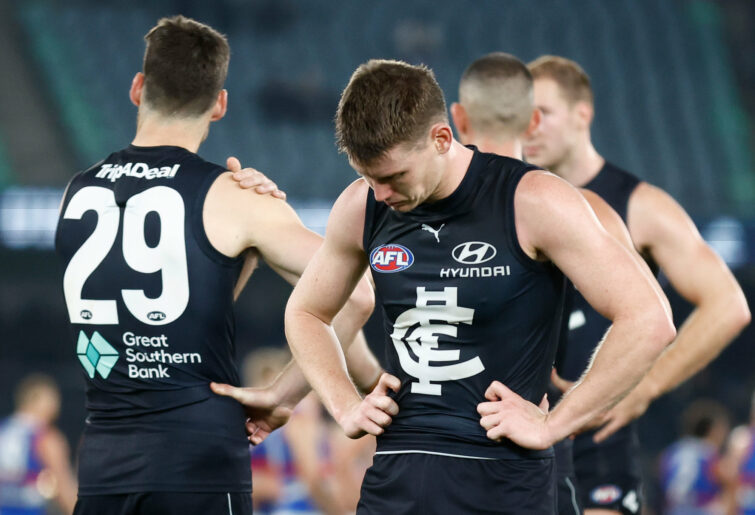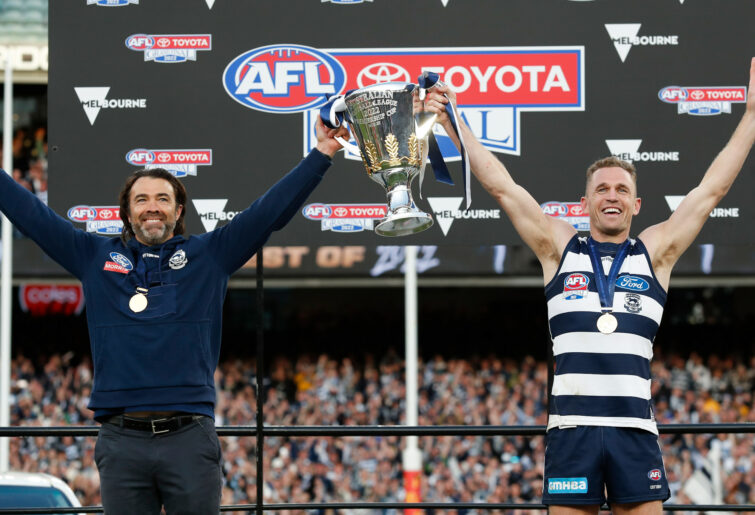By the age of forty my father had seen his beloved Carlton win eight VFL/AFL premierships. I am currently 33, and I have seen one.
Did I do something to you, football gods? I have always been loyal, have I not? I buy your merchandise. I eat your overpriced food and drink your mid-strength beer.
I submit to your relentless demands to gamble… responsibly. I even went to that awful sermon you called AFLX. Well, for a half anyway.
So why have you forsaken me and my people?
My admittedly vague memories of my only premiership experience are nonetheless heavenly. A Carlton super team smashed Geelong by 61 points on the way to their 16th flag. The Cats, meanwhile, rued their fourth grand final defeat in six years, extending their premiership drought to 33 seasons, with no end in sight.
Fast-forward three decades or so, and Carlton’s trophy cabinet remains undisturbed but for the five wooden spoons sitting sheepishly at the door. And the Cats? Six grand finals, four flags, and finals appearances year, after year, after year…

Sam Walsh of the Blues looks dejected after a loss. (Photo by Michael Willson/AFL Photos via Getty Images)
So, what happened? As it turns out, the football gods got back to me. ‘Don’t look at us. Look back. Look at yourselves.’ So, I did.
When Carlton were once kings, football was slowly suffocating to death. In the 1980s, the disparity in wealth in an unregulated VFL was sending half the competition broke.
Radical change was needed to save the game, including national expansion, rationalisation of clubs and grounds, equalisation measures, and an independent Commission cloaked in near absolute power.
The VFL would adopt all these measures and more, to become the AFL in 1990. It was here the road diverged in the footballing woods, with Carlton and Geelong walking different paths. And that has made all the difference.
Saddled with a $10 million debt and decades of failure, Geelong embraced the winds of change. While new president Frank Costa and CEO Brian Cook sought about making the club a profitable business, they put in place an on-field team that changed the fortunes of the Cats ever since.
In 1999, Mark Thompson was appointed as coach, a non-Geelong person with an impressive playing record and coaching pedigree.
Along with recruiter Andrew Wells, Thompson rebuilt the core of the team’s list using the still dubious tool of the national draft. In a two-year period, they acquired the names Corey, Chapman, Ling, Enright, Bartel, Kelly, Johnson, and Ablett Jnr. Not bad.
Progress was slow, but back-to-back finals campaigns in 2004 and 2005 indicated things were on track. However, in 2006 the cart began to wobble as the flag favourite Cats could only muster a 10th placed finish. Irate fans and grumbling powerbrokers called for Thompson’s head, while a potential boardroom challenge threatened to derail Costa and Cook’s leadership.

(Photo by Michael Willson/AFL Photos via Getty Images)
After an exhaustive internal review, the club decided to hold firm on their vision for he 2007 season. Supported by a beefed-up football department, things suddenly clicked.
From Round 6 Geelong won 19 of its next 20 matches through Thompson’s ultra-attacking gameplan, capped off by a 119-point trouncing of Port Adelaide to win its first flag in 44 years. ‘I think we have all grown up this year,’ Cook reflected, ‘we changed our ways.’
Where Geelong looked to the future in 1999, Carlton clung to the past. They had always been a ‘big’ club, wearing their arrogance as a badge of pride: ‘Cause we’re Carlton!’ club president Jack Elliot would boom when asked why the Navy Blues were so successful.
But football was no longer the wild west, separated by the quick and the dead. The Commission was the new sheriff in town, and unlike previous incarnations had real power and intent.
Carlton’s hubris proved its own downfall. After several slaps on the wrist for salary cap breaches in the 1990s, the AFL finally brought down a sledgehammer. Finding the club guilty of ‘systematic breaches’ between 1998 and 2001, it was fined $987,500 and denied picks in the 2002 and 2003 national drafts.
The sanctions were unprecedented, sending shockwaves throughout the competition. Carlton, meanwhile, imploded, sacking four directors and exiling Elliot, before finishing dead last in 2002, 2005 and 2006.
The experience should have chastened the club. It did not, and instead built what should have been its own dynasty on rotten foundations. When the draft was finally opened it was embraced with a disconcerting zeal. Rumours of tanking to acquire the best picks between 2005 and 2007 were rife. It also could not help but bring out the old paper bag again to lure in West Coast champion Chris Judd, albeit this time in the lame disguise as an environmental ambassador for VISY.
By 2008, the Empire appeared ready to strike back with Brett Ratten as coach. ‘They know we’re coming,’ crowed the clubs media department. But the board, and behind it a gang of wealthy benefactors, were impatient for success.
Three consecutive finals appearances were deemed insufficient when the team lost to newcomers Gold Coast to miss the finals in late 2012. The crumbling pillars gave way as the board impulsively sacked Ratten in favour of the recently made available Mick Malthouse.
A disenchanted playing body quickly fell apart, and Carlton’s messiah complex proved an illusion. ‘When he left, my love for the club deteriorated,’ recalled Mitch Robinson, ‘I just hated playing.’ Another list rebuild under Brendon Bolton was detonated by the board at year three, and the hiring of interim coach David Teague lasted barely two.
In every way Carlton had erred in its obsession to return to the top, simply because it continued to operate as though it was playing in the laissez faire world of pre-1990 football. Carlton’s belief that success was its birthright blinded it to the regulated playing field it was now competing on. It could no longer buy or bludgeon its way to success.
Geelong’s long-suffering pain and escape from near footballing death had taught it these lessons well. Premierships must be earnt, as John Worsfold remarked in 2020: ‘No one team has any more right to be successful quicker than any other team, just because they’re a big-name club.’
Once more Carlton is going through the familiar cycle. Will they look to take another short cut? Maybe. Maybe not. Brian Cook appears the right man to steady the ship for the Blues, as he has done so many times before. Perhaps the old saying is true: great football clubs are always rising and falling in Australia.






























































































